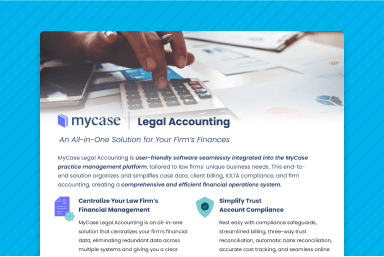Conflict-Checking Software For Law Firms: The Value of Full-Text Search

Your law firm’s intake process is an important part of profitability because, without clients, your firm has no income. Unfortunately, client intake can be time-consuming if your firm doesn’t have the right tools and processes.
That’s why the legal software you choose, and its conflict-checking features, are so essential. The more efficient your firm’s process for onboarding new clients, the quicker you’ll be able to do what your firm was hired—and paid—to do: represent the interests of your clients.
What is a Conflict-Checking System?
You’ll find a good definition of a conflict-checking system in NYC Bar Formal Opinion 2003-03. According to the New York City Bar Association’s Professional Ethics Committee, a conflict-checking system is a process “by which proposed engagements are checked against current and previous engagements.”
According to the NYC Ethics Committee, an effective system:
- Enables a search of the firm’s database
- Allows lawyers to communicate with others in the firm who have relevant information
- Ensures easy access to the firm’s client files or other information regarding particular engagements
- Provides the ability to obtain additional relevant information if needed
The NYC Ethics Committee explained that each firm’s records would vary, depending on practice area, firm structure, past practices, and more. However, regardless of a firm’s specific circumstances, “all law firms must keep certain minimum written or electronic records of each new or prospective engagement and must consult those records when checking proposed new engagements for conflicts of interest.”
How to Ensure Your Conflict-Checking System is Ethically Compliant

While ethical obligations regarding law firm oversight vary from one jurisdiction to the next, one thing is clear: accurate conflict checks are crucial. As explained in ABA Formal Opinion 467, when checking for conflicts, it’s vital to have office-wide conflict-checking policies and procedures. Law firms must establish internal policies and procedures that address confidentiality obligations and provide processes for detecting and resolving conflicts of interest.
The failure to conduct an accurate and comprehensive conflict check for each new case can result in disciplinary action. The NYC Ethics Committee cautioned that the failure “to keep records or to have a policy which complies with this subdivision…shall be a violation by the firm.”
Because conflict checking is an integral part of a law firm’s intake process, it’s no surprise that most firms use conflict-checking technology. According to the ABA Profile of the Profession 2021, the software most often available in law firms is conflict-checking software (63%).
The reason so many firms already use this type of software is simple: It makes accurate, timely, and ethically-compliant conflict checks easy.
What Records Must be Maintained by Law Firms?
Generally speaking, law firms in all jurisdictions are required to maintain certain types of information to ensure that a comprehensive conflict check can occur. The NYC Ethics Committee provides a helpful list of records that every law firm should have available and capable of being searched for conflicts, which include:
- Client names, including the complete and precise name of each client the firm currently represents.
- Adverse party names, including the precise names of parties involved in a matter whose interests are materially adverse to each party the firm represents.
- A description of the engagement, which includes a brief description of each engagement or prospective engagement.
When the information above is readily available, firms can use software that provides a full-text search of all law firm data, such as law practice management software. As a result, they can detect the vast majority of potential conflicts prior to accepting a new client.
Why is Full-Text Search of Law Firm Records Important?

According to the NYC Ethics Committee, records must be kept in written or electronic form and must “be maintained in a way that allows them to be quickly and accurately checked for possible conflicts.” The ability to quickly search law firm data and case-related information ensures an accurate conflict check. Full-text search of electronic client records is one of the key ways to get this done and thus ensure ethical compliance.
Compliant Conflict Checking: Next Steps
Is your law firm compliant when it comes to conflict checking? Does your team maintain the proper records in the required format, and is the information easily searchable and accessible? If not, there’s no better time than now to upgrade to law practice management software that gets the job done.
Try MyCase legal practice management software free for 10 days. There’s no credit card required, and you can cancel anytime.


